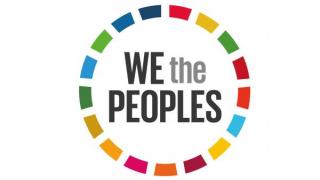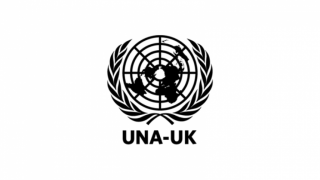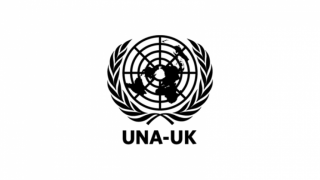
UNA-UK's Executive Director, Natalie Samarasinghe, travelled to the UN in New York to speak at the UN DPI/NGO Conference “We the Peoples: Together Finding Global Solutions for Global Problems.”
Participants at the conference worked together to produce an outcome document, which calls for a "people-centered multilateralism" which seeks to expand “the role of civil society partnerships to advance the sustainable development goals.”
As a part of the larger conversation on UN reform, Ms Samarasinghe highlighted the need for mass-public mobilisation if the agenda is to be successful, which requires accessible language and outreach efforts if we are to reach beyond the traditional, UN-focussed civil society community.
Commenting on the use of the phrase multilateralism, Ms Samarasinghe said:
“If we’re talking about communications I think the phrase people centred multilateralism will mean something here in this building, but when we go outside ... multilateralism is not a word that people use on a day-to-day basis”
“The risk of exclusion is something that doesn’t get talked about often enough. And we see that in the backlash to multilateralism -- populism on the rise -- it is ultimately about not feeling that you’re part of the conversation”
Ms Samarasinghe went on to highlight the importance of the call for a "the global partnership," as outlined in the SDGs, in finding ways for civil society and the private sector to play a meaningful role in UN decision-making and in the delivery of global goods. She concluded with the response:
"I think switching our approach to putting people first, that should make a difference. If that is the lens by which we are judging the things that we do, that should lead to changes quite quickly on the ground."
UNA-UK will continue to build international support for fundamental reform to the United Nations, in line with the outcome document, and work towards a 2020 summit where such reforms can be taken forward.
Watch the event
Outcome document
(Originally published on the UN website here)
A Time to Reawaken International Cooperation
Each day at the United Nations, Member States affirm that it is only by reaching across divisions that we prosper together in a better, more peaceful world. At the United Nations, governments partner with civil society to defend human rights and advance sustainable development. Moreover, the United Nations has been a platform for activists, artists, entrepreneurs, and social movements that have shaped the world we live in. Billions of people have benefited from this cooperation.
However, far too many are being left behind. Violations of international norms by those with power, together with widening inequality, have caused some to doubt that the potential benefits of international cooperation can be realized. Since 1945, the distribution of power in the world has shifted dramatically. Today, corporations, non-state armed groups, and transnational social movements influence the fate of billions.
The United Nations’ legitimacy depends in part on its ability to build consensus in a world where state power has become more diffuse and where non-state actors play a substantial role.
When the current multilateral system falters, opportunists argue against the idea that cooperation helps everyone. In place of multilateralism, they cultivate a narrow nationalism that promises development for some at the expense of all others, especially the most vulnerable.
We the Peoples reject the false choice between nationalism and globalism. We offer people-centered multilateralism as an optimistic and realistic alternative. Its inclusive processes will foster a sense of shared ownership, build trust, and result in greater effectiveness. To bring people-centered multilateralism to maturity, we, as civil society, pledge to work side by side with governments, the private sector, and other stakeholders to pursue the SDGs. Therefore, civil society claims its unique space for action that transcends national identities and other affiliations.
A Time to Renew Civil Society Commitment
In order for people-centered multilateralism to take root, civil society must be able to carry out its critical work. However, every day, civil society representatives face threats to their physical safety and their rights to advocate. Our colleagues and friends are being arrested, abducted, and even murdered with impunity. Progress toward sustainable development requires a multilateral system that effectively safeguards non-governmental actors.
As civil society, we identify across the full spectrum of wealth, age, race, gender, sex, ability, power, religion, culture, and sexual orientation. We embrace our distinct identities, and we pledge to work together across our differences to guarantee that the benefits of development are shared equitably across generations, now and in the future.
Civil society is already contributing to equitable and sustainable development. After this conference, we intend to go further.
Therefore, as civil society, we commit:
- To embrace gender equity as an integral component of social justice,
- To operationalize the Global Compact on Migration and the Global Compact on Refugees by prioritizing the rights and dignity of forced migrants and people in fragile and conflict-affected states,
- To affirm the importance of international law and principles of cooperation,
- To share information and digital technology, media, and communication tools in a democratic manner to amplify the voices of those who are systematically marginalized and silenced,
- To act in solidarity with civil society representatives whose safety and rights are threatened,
- To empower and engage young people as partners to achieve the SDGs as outlined in the “‘We the Future’: Youth Declaration,”
- To build on economic and cultural innovations that strengthen social, economic, and environmental foundations of development, and
- To serve as independent sources of analysis, advocacy, and action to hold states, corporations, and other stakeholders accountable to the standards and values adopted in the 2030 Agenda.
A Time to Join with Civil Society
Cooperation and partnerships with Member States, the UN development system, and the private sector are needed on all levels to achieve the 2030 Agenda.
Therefore, as civil society, we call upon
Member States to:
- Respect, protect, and promote the rights of civil society to hold public and private institutions accountable and to participate in decision making,
- Advance people-centered multilateralism by developing proposals to revitalize the United Nations on the occasion of its 75th Anniversary in 2020,
- Fulfil their obligations under international law,
- Honour and uphold the commitments made in the Universal Declaration of Human Rights,
- Reaffirm the Declaration on Human Rights Defenders on its 20th anniversary by working to ensure the safety, expression, and freedom of association of those who speak out on abuses, and
- Enact policies aimed at eradicating extreme inequality, including by preventing individual and corporate tax avoidance and rights violations, with particular attention to the upcoming Special Session on Financing for Development;
Multinational corporations to:
- Adopt business models that shoulder social and environmental responsibility aligned with the SDGs and the Global Compact, and
- Deliver fair economic returns on value added by local communities;
The United Nations Secretary-General and the United Nations to:
- Play their historic roles as conveners of states and stakeholders, to guarantee that the most marginalized peoples throughout the world are heard most clearly and to ensure that our planet remains a place where all of humanity can flourish,
- Demand an end to tax avoidance, corruption, and rights violations by corporations, and
- Remain focused on intergenerational equity, safeguarding the planet’s health and natural resources for generations to come;
All decision-makers to:
- Engage in real partnerships with civil society that, as called for by the “‘We the Future’: Youth Declaration,” enable vulnerable groups to shape policies that affect their lives, and
- Financially support and promote change-makers, regardless of age, in public policy decisions and to follow the example of innovative and powerful social movements.
Resolution
We can transform the international order to bring about a more peaceful, just, and sustainable world through people-centered multilateralism. We commit to support the successful repositioning of the United Nations system with our collaboration, passion, and creativity. People-centered multilateralism, through its worldwide institutions, culture, and work in a robust and protected civil society space, will generate the political and social support needed to endure for this generation and future generations.
Therefore, we who are gathered at the 67th United Nations DPI NGO Conference commit to redouble our efforts to establish people-centered multilateral cooperation in a spirit of global citizenship. Beginning with the upcoming Paris Peace Forum in November of 2018, we encourage civil society representatives to meet again during future international conferences to assess progress under this Call to Action. We call upon states, corporations, institutions, and other collective and individual stakeholders to join our effort. By so doing, together we will further the 2030 Agenda for Sustainable Development and ensure that no one is left behind.






